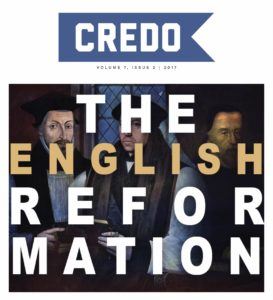Preaching on the afternoon of June 9, 1536, the Bishop of Worcester, Hugh Latimer (c.1487-1555), cast a startling vision for the reforming of the English pastoral ministry. Startling because it was at the feet of his audience—a crowd including bishops and deans, archdeacons and diocesan clergy—that Latimer laid the responsibility for England’s spiritual decrepitude. Imagine how jolted Latimer’s contemporaries must have felt, after hearing something like this:
[Y]e that be prelates, look well to your office; for right prelating is busy labouring, and not lording. Therefore preach and teach, and let your plough be doing. Ye lords, I say, that live like loiterers, look well to your office; the plough is your office and charge. If you live idle and loiter, you do not your duty, you follow not your vocation: let your plough therefore be going, and not cease, that the ground may bring forth fruit. (WHL, p.65)
For Latimer, the burden of responsibility for England’s reformation rested squarely (from a human point of view!) on the shoulders of her ministers. If England wanted reformation, therefore, she needed reformed ministers. And reformed ministers was precisely what Latimer aimed to provide.
The following year, Latimer issued a “to-do” list for his clergy, called visitation injunctions. What’s striking about this to-do list is how it illuminates one way in which Latimer went about forming reformed ministers: He gave them a crash course in Christian discipleship.
Thankfully, Latimer’s instructions don’t have a sell-by date! The wisdom on offer here, for any Christian, is very much alive. Restoring these practices ourselves, if and when we stray from them, may well prove the first step toward getting the gospel plough going in our own lives and ministries, “that the ground may bring forth fruit” once again.
I. “Catechist, catechize thyself!”
Latimer began by calling his clergy to a deeper knowledge of the Scriptures. “Every one of you,” Latimer required, must “have of your own a whole bible, if ye can conveniently, or at the least a new Testament, both in Latin and English, before the feast of the nativity of our Lord next ensuing” (Visitation Articles and Injunctions, 15). Significantly, this was as critical for those whose ministry played out in a community, as it was for those who ministered from the pulpit. Thus, Latimer required the same thing of every member of the convent at St. Mary’s House (VAI, 13). The starting point for an effective ministry was the biblical text, available in a form capable of being rightly understood and shared.
But, Latimer warned, the Bible mustn’t simply decorate the bedside table. Every minister needed to “read over and study every day one chapter at the least, conferring the Latin and the English together, proceeding from the chapter from the beginning of the book to the end, having no necessary let to the contrary” (VAI, 15). In other words, Latimer said, know the Scriptures: study them properly, handle them rightly, wrestle them with every ounce of blood, sweat, and tears you can muster. Read, mark, learn, inwardly digest, as Thomas Cranmer put it: remembering, all the while, that biblical learning (usually conducted in Latin) must benefit the unlearned (who need to hear it in English)!
If having a Bible and studying it properly were not enough, Latimer also exhorted his clergy to catechize—not principally others, interestingly, but themselves! Click To Tweet “[N]ot only in preaching and open communication, but also in secret,” Latimer urged them, “say the Pater noster [Our Father], the Creed, and the Ten Commandments” (VAI, 17). Training oneself in these three pillars of classical Christian catechesis was an absolute necessity if one wanted to share the gospel effectively.
In the injunctions, as in his recorded sermons, Latimer presses home the same point: the power that advances the gospel plough is nothing other than the word of God. And the ordinary order in which the word of God does its work is to plough the minister’s heart first.
II. Encourage godly learning
Another key theme in Latimer’s injunctions was the encouragement of the pursuit of godly learning by the laity. This included the study of the Scriptures, but it also extended to the study of literature previously considered the special property of the clergy.
This call to godly learning certainly applied, in appropriate measure, to children. For, once a minister had catechized himself, he would then be in a position to “instruct and teach the children of your parish, such as will come to you at the least, to read English, so that thereby they may the better learn how to believe, how to pray, and to live to God’s pleasure” (VAI, 17).
Slightly more controversially, however, Latimer also insisted that the exhortation to godly learning must extend to adults. Latimer vehemently denied that divinity is the cottage industry of the clergy: “[N]o parson, vicar, curate, nor chantry priest, from henceforth do discourage any lay person from the reading of any good books either in Latin or English, but rather animate and encourage them unto such things” (VAI, 17).
Put into a twenty-first century register, this might sound something like: “Do not discourage any keen person from learning to use your Bible commentaries, whether devotional or technical.” More important than dazzling people with interesting tidbits about mystery cults or Codex Sinaiticus, Latimer would have said, is the minister’s responsibility to equip his people to engage the scriptures to the best of their ability.
Ministers have always faced the temptation to appear sharper by leaving others dull. A reforming minister sharpens, even—and especially!—when it reveals his own dullness.
III. Moving people from works-righteousness to righteous works
Latimer stressed a third theme, as well. For Latimer, it was crucial that every minister sought to move people from works-righteousness to righteous works, or in his words, “from will-works to the necessary works of God, works of mercy and charity.” Click To Tweet (VAI, 16).
Plenty of seventeenth-century divines, looking back at the Reformers’ doctrine of justification by faith alone, argued that the English Reformers followed the continental Reformers by turning “righteous works” into a dirty term. Looking at Latimer, it is difficult to see how they arrived at that conclusion. For Latimer clearly affirmed that it is by faith alone that one is counted righteous before God (see his Works, vol. I (Cambridge, 1844),235-36). And, at the same time, Latimer insisted that righteous works flow necessarily from justification.
We could underline the point with the imagery of two different sources of water—the one, a shallow, stagnant, muddy well; the other, a racing river, bursting with torrents of fresh water. When one encounters the grace of God in Jesus Christ, she is moved from will-works, works drawn from the tepid well of the fallen human will, to necessary works of God, of mercy and charity, works rushing forth necessarily in response to the salvation in which the Christian has been made to share.
Or we could change the metaphor. For Latimer, necessary works are the Christian’s wardrobe:
Whosoever now is endued with love and charity… we may call Christ’s servant, for love is the token whereby you shall know such a servant that pertaineth to Christ; so that charity may be called the very livery of Christ: he that hath charity is Christ’s servant; he that hath not charity is the servant of the devil. For like as Christ’s livery is love and charity, so the devil’s livery is hatred, malice, and discord. (Works, 448)
A “starter kit” for the English Reformation
So then, we have three practices, vital to gospel ministry (and therefore Christian discipleship!), as it was envisioned and undertaken by Latimer:
- Commit yourself to the study of the Scriptures
- Furnish fellow believers with the tools they need to do the same
- Encourage the fruitfulness that the gospel produces
Taken together, these three practices provide a “starter kit” for anyone who wants to dig into the riches of the reformation Anglican tradition. Indeed, they remain non-negotiable for anyone in any capacity of Christian leadership, and in any season of his Christian life. For, as Latimer stressed, the Christian is not the only one ploughing the field:
There is one that passeth all the other, and is the most diligent prelate and preacher in all England. And will ye know who it is? I will tell you: it is the devil. He is the most diligent preacher of all other; he is never out of his diocess; he is never from his cure; ye shall never find him unoccupied; he is ever in his parish; he keepeth residence at all times; ye shall never find him out of the way, call for him when you will he is ever at home; the diligentest preacher in all the realm; he is ever at his plough. (Works, 70)
We face the same enemy today as Latimer faced in 1536. And while that enemy is infinitely outstripped by the gospel, and all his laboring is destined for ruin, far be it from any Christian to leave diligent preaching to the enemy! As earnestly as Latimer did, therefore, “let your plough… be going, and not cease, that the ground may bring forth fruit.”


